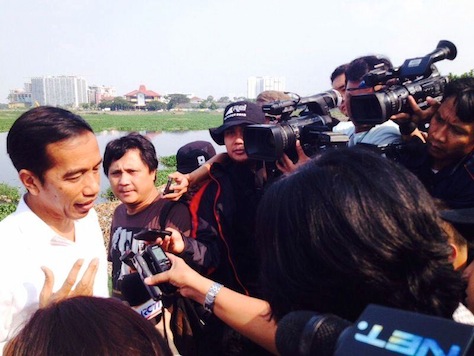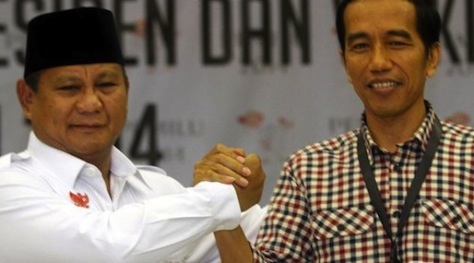The two-week gap between the July 9 Indonesian election and today’s announcement of final results could have been a tense showdown between the two candidates, one a political neophyte, the other a stalwart of the Suharto-era military, who contested Indonesia’s closest-ever direct presidential election. ![]()
As it turns out, what could have been a constitutional crisis in Indonesia was an example of orderly democratic transition.
Joko Widodo (known as ‘Jokowi’), governor of Jakarta since late 2012, has won the Indonesian presidency with 53.15% of the vote. His rival, former general Prabowo Subianto, won just 46.85%. The gap of more than 6% is actually larger than many ‘quick counts’ reported in the vote’s aftermath.
Prabowo (pictured above, left, meeting with Jokowi last week), who refused to concede defeat, despite signs of a narrow Jokowi win, worked with Jokowi and outgoing president Susilo Bambang Yudhoyono (known by his initials, ‘SBY’) to keep tensions relatively low, and Prabowo’s campaign staff over the weekend all but conceded the Indonesian presidency to Jokowi. Prabowo’s team, which had indicated it might file a lawsuit to contest alleged fraud, has now said it won’t file a case in Indonesia’s constitutional court.
* * * * *
RELATED: What Jokowi’s apparent victory in Indonesia means
* * * * *
That’s worth a sigh of relief, given the nationalist themes that Prabowo struck in his presidential campaign. At one point, the former Suharto son-in-law, whose human rights record in the Indonesian special forces came under significant scrutiny during the election, argued that democracy wasn’t right for Indonesia and that he might return to the country’s more authoritarian 1945 constitution.
Jokowi’s victory, above all, cements the foundations of Indonesian democracy.
So what happens next?
Jokowi will be inaugurated no later than October 20. In the meanwhile, expect a significant amount of churn within Indonesia’s politics.
1. We still don’t know Jokowi’s economic and political agenda
The biggest mystery of all is what Jokowi intends to do now that he’s won the presidency.
When he won the Jakarta governorship, he moved quickly to introduce a universal health care scheme, minimum wage increases and expanded educational spending. The nature of Indonesia’s national government, however, means that any reforms will come much more slowly.
One of Jokowi’s problems during the campaign was an inexplicably lackluster message that depended more on personality and broad themes than real policy promises. As Prabowo became an increasing threat, Jokowi’s own rhetoric began matching the protectionist, economically nationalist themes that Prabowo had struck.
Though Indonesia’s economy is growing faster than India’s these days, growth is slowing, which will require some tough budget choices in the first year of the Jokowi administration, and he’s widely expected to cut fuel subsidies.
As between the two candidates, Jokowi has always been the more likely to pursue significant liberalization, including strengthening Indonesia’s trade ties regionally. But whether Jokowi uses his mandate to do so is another question. Investors, however, are thrilled with Jokowi’s win, believing that he is less likely than Prabowo to pursue explicitly protectionist measures, such as a new law earlier this year restricting the export of unprocessed iron ore.
2. Expect Jokowi to rapidly build a working legislative majority
Though Jokowi comes from the Indonesian Democratic Party of Struggle (PDI-P, Partai Demokrasi Indonesia Perjuangan), which narrowly won the greatest number of seats in the Indonesian legislature in elections held in April, the coalition he assembled for the presidential campaign fell far short of a majority.
It includes just the PDI-P, two minor secular parties and the largest of Indonesia’s four major Islamist parties, the Partai Kebangkitan Bangsa (PKB, National Awakening Party).
In contrast, Prabowo assembled a coalition that included his own economically nationalist Gerindra (Partai Gerakan Indonesia Raya, the Great Indonesia Movement Party), which is the third-largest party in the Indonesian legislature; the other three Islamist parties; the former Suharto-era governing party Golkar (Partai Golongan Karya, Party of the Functional Groups); and SBY’s own Partai Demokrat (Democratic Party), which placed far behind in fourth place in the April legislative elections.
But there’s good reason to believe that Jokowi will easily pull some of those fair-weather allies away from Prabowo.
For instance, his running mate, Jusuf Kalla, is a former Golkar leader who will now return to the vice presidency after a stint as Yudhoyono’s first vice president between 2004 and 2009. Kalla’s decision to run on the Jokowi ticket split Golkar’s voters, as well as its leadership, and but it gave Golkar a convenient foothold in both the Jokowi and Prabowo camps. Expect Golkar to line up behind Jokowi fairly soon, and expect Jokowi to welcome the relatively liberal Golkar, which is more likely than Gerindra or the Islamist parties to support any potential economic reforms.
With Golkar — and Golkar alone — Jokowi will have a legislative majority.
The Islamist parties have spent the past decade in SBY’s governing coalition, and they would almost certainly rather remain inside the government tent than outside it, though that might be up to Jokowi.
The Democrats, which only endorsed Prabowo at the last minute when Prabowo’s momentum had all but demolished Jokowi’s once seemingly insurmountable lead, are in the worst possible position. Not only did the Democrats lack the strength to command a spot on either of the two presidential tickets, they chose the wrong candidate after sitting out much of the campaign as neutral. What’s more, former president Megawati Sukarnoputri, the leader of the PDI-P, still harbors resentment against Yudhoyono for challenging her for the presidency. She was loathe to work with his party during the campaign, so she will almost certainly disdain rescuing the Democrats from the opposition wilderness where, without Yudhoyono, the party might simply fade away by 2019.
3. Jusuf Kalla will displace Aburizal Bakrie as the chief power behind Golkar.
Aburizal Bakrie’s decision to place Golkar’s significant machinery behind Prabowo arguably changed the nature of the presidential campaign. As one of Indonesia’s richest men, Aburizal’s support also brought with it some of the country’s most important media assets, which gave Prabowo an instant advantage in television media. Though Kalla’s decision to support Jokowi would pull away some Golkar voters, especially on Sulawesi, Kalla’s home, Golkar’s official party network was expected to pull out votes for Prabowo everywhere else in the country.
But Prabowo’s victory has called Aburizal’s leadership into question. Already unpopular, due to the role that one of his businesses played in fatal mudslides several years ago, Aburizal failed to win support for his own presidential campaign.
Accordingly, it will be a surprise if Aburizal holds onto Golkar’s leadership through Jokowi’s inauguration. Though Kalla, as vice president, won’t necessarily take over the Golkar leadership himself, he’ll clearly be in the driver’s seat for a party that still holds the second-largest bloc of seats in the 560-member Dewan Perwakilan Rakyat (DPR, People’s Representative Council),
4. Megawati Sukarnoputri is now one of the most important voices in Indonesian governance
The biggest question now, in terms of personality, is the role that Megawati, the former president, will play in the Jokowi administration.
On the one hand, she last held office a decade ago. As the daughter of Indonesia’s first post-independence leader, the left-leaning, Soviet-backed, authoritarian Sukarno, she is a link to the first days of post-colonial Indonesia — hardly the right face for a president whose most significant asset is his youth and that he represents generational change.
Nevertheless, Megawati played a key role in Indonesia’s democratic transition. Though she had almost certainly hoped to make a third consecutive presidential bid to regain the office she lost in 2004, her decision to stand down paved the way for the much more popular Jokowi to win the presidency instead.
Don’t expect Jokowi to be as pliant to Megawati as former Indian prime minister Manmohan Singh was to Sonia Gandhi, the president of Singh’s governing Indian National Congress. But it’s clear that she will remain an important voice, if even from her perch as chairperson of the PDI-P.
In a sense, Megawati has finally achieved her goal of winning the Indonesian presidency for the PDI-P. It just won’t be with her at the helm.

